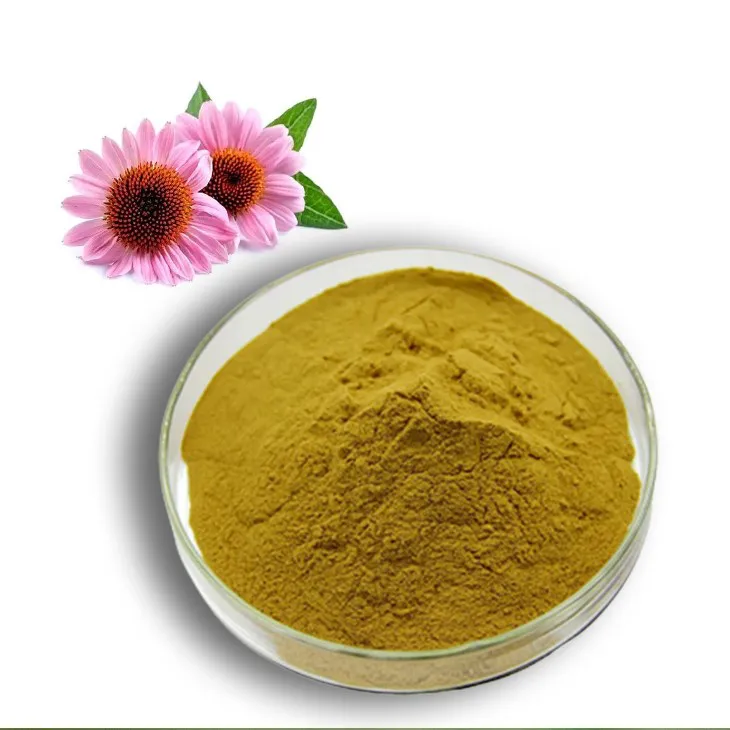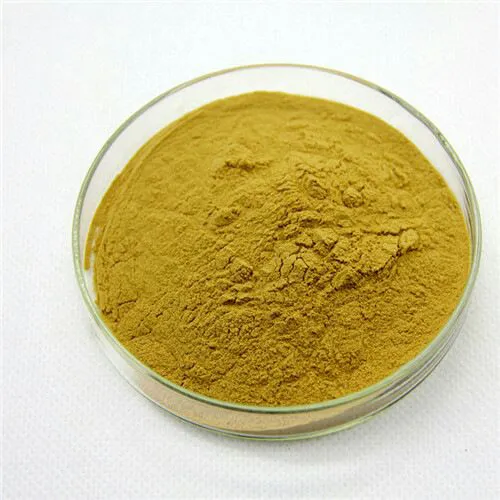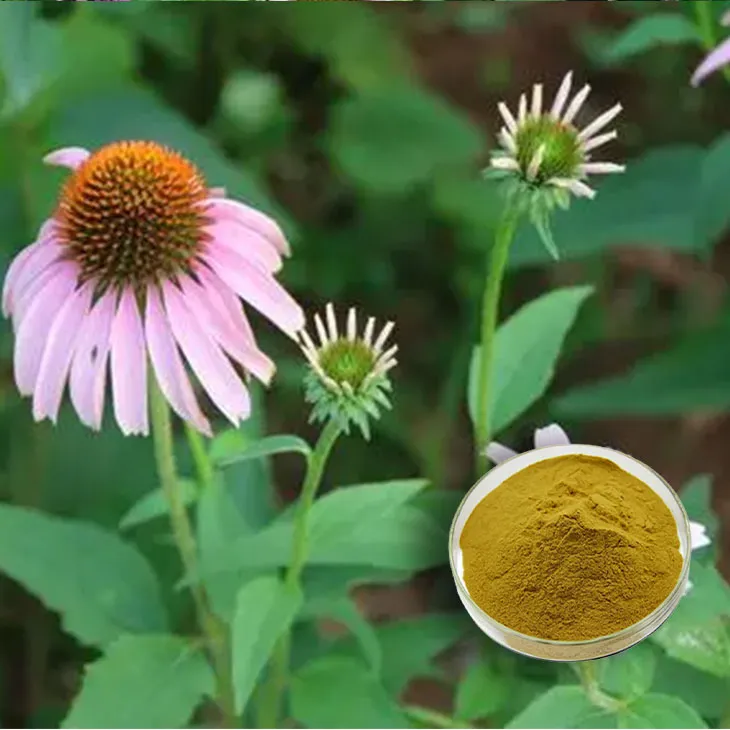- 0086-571-85302990
- sales@greenskybio.com
Echinacea Extract in Trinidad and Tobago.
2024-12-20

Introduction to Echinacea in Trinidad and Tobago
Echinacea, a globally recognized plant in the realm of herbal medicine, has found a favorable home in the Trinidad and Tobago environment. The country's unique geographical and climatic conditions seem to be conducive to the growth of this remarkable plant. The presence of Echinacea in Trinidad and Tobago is not just a botanical curiosity but also holds significant potential in various aspects, especially when it comes to the extraction of its valuable components.

The Extraction Process
The process of obtaining Echinacea Extract in Trinidad and Tobago is a meticulous one. Skilled workers and advanced techniques are often involved to ensure that the plant's valuable components are preserved. This typically begins with the careful harvesting of the Echinacea plants at the optimal time. Harvesting too early or too late could result in a lower quality extract.
Once harvested, the plants are then subjected to a series of processing steps. These may include cleaning to remove any dirt or impurities, followed by drying in a controlled environment. Drying is a crucial step as it helps to concentrate the active compounds in the plant. After drying, the plants are then ground into a fine powder, which serves as the raw material for the extraction process.
The extraction itself can be carried out using various methods, such as solvent extraction. In solvent extraction, a suitable solvent is used to dissolve the active compounds from the powdered Echinacea. The choice of solvent is important as it can affect the quality and composition of the final extract. Commonly used solvents include ethanol or water - based solvents, depending on the specific requirements of the extraction process.

Economic Significance
The local production of Echinacea Extract in Trinidad and Tobago is not only a matter of herbal medicine but also a potential economic driver. It has the potential to create jobs at multiple levels.
Farming Jobs
Firstly, in the farming sector, there is a need for farmers to cultivate Echinacea plants. This requires knowledge of the plant's growth requirements, such as the right soil type, amount of sunlight, and watering schedule. Farming of Echinacea can provide employment opportunities for local farmers, especially those who may be looking to diversify their crops. It can also contribute to the overall agricultural economy of the country by adding a new and potentially lucrative crop to the mix.
Extraction and Related Industries
Once the plants are harvested, jobs are created in the extraction process. As mentioned earlier, this involves skilled workers who are involved in the various steps of extraction, from handling the raw materials to operating the extraction equipment. In addition, there are related industries that can benefit from the production of Echinacea Extract. For example, the packaging industry is needed to package the final extract for sale, both locally and internationally. There may also be a need for transportation services to move the raw materials and the finished products, creating more job opportunities in the logistics sector.

Medical Research Potential
From a medical research point of view, the Echinacea extract from Trinidad and Tobago may provide new insights into the treatment of various health conditions.
Unique Properties Due to Growing Conditions
It may interact with the human body in different ways compared to Echinacea products from other sources due to its specific growing conditions. For example, the soil composition, climate, and altitude in Trinidad and Tobago could influence the chemical makeup of the Echinacea plants. This, in turn, could lead to a different effect on inflammation or infection - fighting mechanisms. Medical researchers are interested in studying these differences to better understand how the extract can be used in the treatment of diseases such as the common cold, flu, and other inflammatory conditions.
Potential for New Therapeutic Applications
Furthermore, the Echinacea extract from Trinidad and Tobago may have potential for new therapeutic applications. It could be that certain compounds in the extract that are unique to this region show promise in treating conditions that have not been effectively treated with other Echinacea products. This opens up new avenues for research and development in the field of herbal medicine, and could potentially lead to the discovery of new drugs or treatments.

Sustainable Harvesting and Production
The sustainable harvesting and production of Echinacea extract in Trinidad and Tobago can serve as an example of how a country can balance economic development with environmental conservation, making use of its natural resources in a responsible and beneficial way.
Harvesting Practices
Sustainable harvesting practices are crucial to ensure the long - term availability of Echinacea plants. This involves not over - harvesting the plants, but rather following a planned and regulated harvesting schedule. For example, only a certain percentage of the plants in a given area may be harvested at a time, allowing the remaining plants to continue to grow and reproduce. This helps to maintain the natural population of Echinacea in the wild and also ensures that the ecosystem in which the plants grow is not disrupted.
Environmental Conservation
In addition to sustainable harvesting, the production process also needs to be environmentally friendly. This means using solvents and other chemicals in a way that minimizes environmental impact. For example, choosing biodegradable solvents or recycling solvents where possible. The waste products from the extraction process should also be disposed of properly, either through recycling or in an environmentally friendly manner. By implementing these practices, Trinidad and Tobago can ensure that the production of Echinacea extract is not only economically viable but also environmentally sustainable.
FAQ:
What are the valuable components in Echinacea extract in Trinidad and Tobago?
The valuable components in Echinacea extract typically include various bioactive compounds such as alkamides, polysaccharides, and flavonoids. These components are believed to contribute to its potential health - promoting properties, like enhancing the immune system and having anti - inflammatory effects.
How does the production of Echinacea extract in Trinidad and Tobago create jobs?
The production of Echinacea extract creates jobs in multiple ways. Firstly, in farming, workers are needed to cultivate the Echinacea plants. Then, during the extraction process, skilled labor is required to operate the extraction equipment and ensure the proper isolation of the extract. Additionally, related industries such as packaging and distribution also need manpower, thus providing employment opportunities.
What makes the Echinacea extract in Trinidad and Tobago different from that from other sources?
The difference lies in its specific growing conditions. Trinidad and Tobago has its own unique climate, soil type, and ecological environment. These factors can influence the chemical composition of the Echinacea plants. As a result, the extract may interact with the human body in different ways, perhaps having a distinct effect on inflammation or the body's infection - fighting mechanisms compared to Echinacea products from other regions.
How can the sustainable harvesting of Echinacea in Trinidad and Tobago be achieved?
Sustainable harvesting can be achieved through proper management. This includes setting quotas for the amount of Echinacea that can be harvested each year to ensure that the plant population can regenerate. Additionally, techniques such as selective harvesting, where only mature plants are harvested, and promoting the growth of new plants through seeding or replanting programs can be implemented. Monitoring the health of the Echinacea population regularly is also crucial.
What potential health conditions could the Echinacea extract in Trinidad and Tobago be used to treat?
It may potentially be used to treat conditions related to the immune system, such as the common cold and flu. Its anti - inflammatory properties may also make it useful in treating certain inflammatory conditions like arthritis. However, more research is needed to fully understand and confirm its efficacy in these areas.
Related literature
- Echinacea: Botany, Chemistry, and Medicinal Properties"
- "The Echinacea Advantage: Herbal Support for the Immune System"
- "Echinacea: A Review of Its Role in Health and Disease"
- ▶ Hesperidin
- ▶ citrus bioflavonoids
- ▶ plant extract
- ▶ lycopene
- ▶ Diosmin
- ▶ Grape seed extract
- ▶ Sea buckthorn Juice Powder
- ▶ Beetroot powder
- ▶ Hops Extract
- ▶ Artichoke Extract
- ▶ Reishi mushroom extract
- ▶ Astaxanthin
- ▶ Green Tea Extract
- ▶ Curcumin Extract
- ▶ Horse Chestnut Extract
- ▶ Other Problems
- ▶ Boswellia Serrata Extract
- ▶ Resveratrol Extract
- ▶ Marigold Extract
- ▶ Grape Leaf Extract
- ▶ blog3
- ▶ blog4
- ▶ blog5
-
Feverfew Extract
2024-12-20
-
melatonin extract
2024-12-20
-
Thunder God Vine Extract
2024-12-20
-
Calendula Extract
2024-12-20
-
Hedyotis Diffusa Extract
2024-12-20
-
Bitter Melon Extract
2024-12-20
-
Oyster Mushroom Extract Powder
2024-12-20
-
Green coffee bean Extract
2024-12-20
-
Withania Somnifera Extract
2024-12-20
-
Tormentil Extract
2024-12-20





















